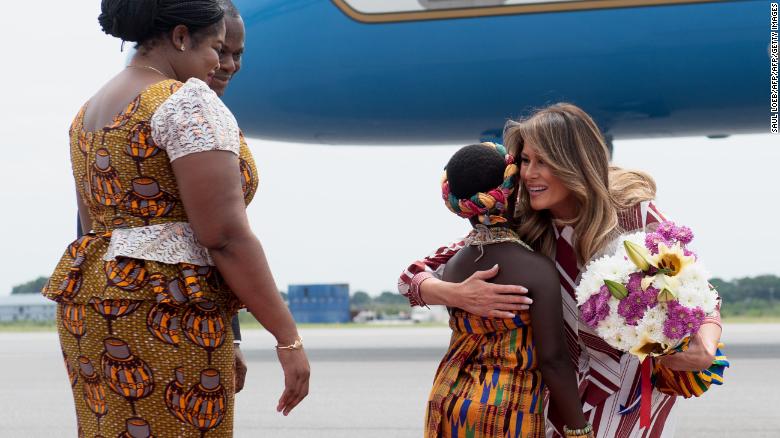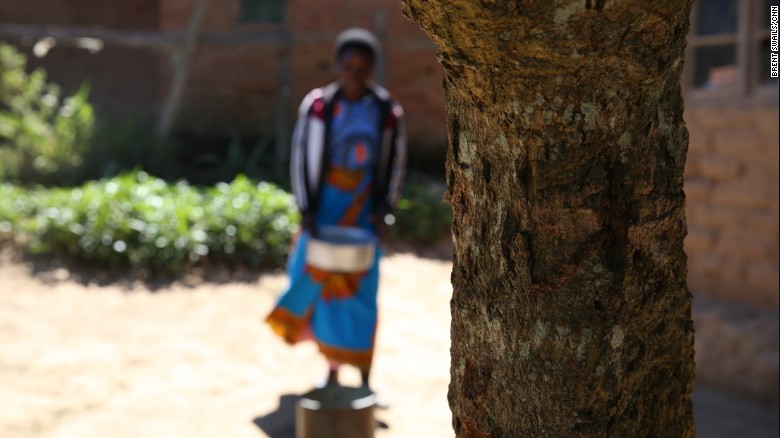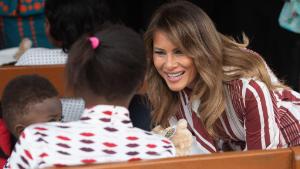Melania Trump's sunny message in Africa at odds with US policy
First lady Melania Trump's solo swing through Ghana, Malawi, Kenya and Egypt should come as no surprise.
It has become something of a tradition for US first ladies.
In the 1990s, Hillary Clinton met with Nelson Mandela and toured his jail cell on Robben Island. Laura Bush traveled to Africa to visit HIV/AIDS programs. Michelle Obama, who focused more on domestic issues, still made it out to South Africa and Botswana on a solo tour.
On her first solo trip abroad as first lady, Melania Trump wants to promote her "Be Best" campaign and highlight women's and children's health.

Melania Trump receives flowers during an arrival ceremony after landing at Kotoka International Airport in Accra, Ghana, on Tuesday.
But what differs from her predecessors' tours is that the sunny messaging during Trump's trip to Africa falls at odds with her husband's policies, say public health experts and leaders of nongovernmental organizations.
"Because of President Trump's policies, we are denying women and children critical health assistance," said a director of a major family-planning and HIV charity in Malawi, adding that the presidential decree signed by Donald Trump just days into office is hurting the very people she wants to help.
Like many of the people interviewed for this article, the director refused to be identified because it could jeopardize the charity's relationship with US Agency for International Development (USAID).
'Global gag rule'
On January 23, 2017, President Trump reinstated the so-called Mexico City policy, which cuts US funding for foreign charities that provide or promote abortion -- even if abortion is legal in that country.
First adopted by President Ronald Reagan, it is generally enacted during Republican administrations and dropped during Democratic ones, but Trump greatly expanded it to cover all health-related charities, not just family-planning organizations.
Charities receiving US funding are also banned from advocating for changes in the law where abortion is illegal -- as in Malawi.
"That is why some advocates call it the global gag rule, because it is policing speech as well as access to healthcare," said Jennifer Kates, vice president and director of global health and HIV policy at the Kaiser Family Foundation, a policy group.
Maternal and newborn health are inextricably linked to family planning, said Kates. Shortly after the policy was reinstated, her organization and others predicted dire consequences for families throughout the developing world.
Last year, CNN travelled to Malawi. The country's leading obstetrician was inundated in the main referral hospital in Blantyre, the country's second-largest city. Chisale Mhango was seeing 10 to 15 women a day for post-abortion surgeries. A staunch advocate of women's reproductive rights, he said that the country had made great strides in family-planning awareness, in large part thanks to USAID funding.
But then, and now, he worries that progress could be lost.
In Malawi, women often resort to seeing traditional healers who use poisonous concoctions to terminate pregnancies. The resulting trauma frequently ends in sepsis and sometimes death.
Mhango said the situation has gotten worse since then.
"We need to ensure funding for family planning; otherwise, we will continue to have problems with unsafe abortion," he said.
But as the first lady touches down in Ghana, Malawi and Kenya, the impact of the Mexico City policy on family-planning programs is no longer hypothetical.
The director of the Malawian family-planning charity said it refused to commit to complying with the new rules.

Malawian Flora got an illegal abortion in 2005 from a traditional healer. She said that with the family-planning help now given in Malawi, she could have avoided the unwanted pregnancy.
"We are a right-based organization and we believe those rights should be maintained no matter what," she said.
As a result, the charity has laid off a substantial number of its staff and cut more than a quarter of its health outreach programs because of lost USAID funding.
She said the organization has closed clinics and HIV/AIDS and family-planning services in deep rural areas. Sometimes, they are the only ones operating in those regions.
The charity is now scrambling for funding elsewhere, but some charities feel forced to make a different choice.
Operating in a different part of Malawi, a director of a family-planning organization said there was no choice but to sign up to the conditions.
"Of course, we would want to advocate for the law to change, because we believe that it leads to many unsafe abortions, but we had to drop our advocacy because USAID is a major funder in Malawi," he said.
In Kenya and Ghana, where the governments have been steadily trying to relax rules on abortion to avoid the horrific consequences of unsafe abortions, the policy is also having a chilling effect, according to policy experts.
Marie Stopes International, a London-based pro-choice group and service provider, says that the $60 million gap caused by the US freeze on its funding could result in more than two million unintended pregnancies globally.
Biggest donor
Mark Green, the Trump-appointed administrator of USAID, told CNN that the agency has been upfront with the impacts of the policy.
"Our commitment is to report straight up on the numbers for those who have received funding and those who chose not to take funding because of the policy guidelines. And we remain far and away the largest donor of maternal and child health in the world," he said
And USAID officials believe that it's important to look at the bigger picture.
A USAID official said that the US government has invested more than $47 billion dollars in health in Africa over the past decade.
And American-led initiatives to combat HIV and malaria have saved millions of lives on the continent.
Green, who is widely respected in development circles, has to comply with President Trump's policy.
But his vision for the agency's future mirrors another one of Trump's core demands. USAID is working through major reforms to focus on what officials there call "the journey to self-reliance."
The ultimate goal is to help countries transition away from dependence on foreign aid.
"What we are looking to do appeals to President Trump the businessman," said Green.
CNN has reached out to the White House for comment.
Lead or follow
The Mexico City policy isn't Trump's only foray into foreign aid. The White House has repeatedly asked for significant funding cuts to USAID and the State Department in its proposed budget.
But, so far, there has been bipartisan pushback from Congress -- which passes the budget -- to any major cuts in foreign assistance.
"This kind of positioning from the White House affects our relationship with countries across the globe," said the Kaiser Family Foundation's Kates. "If the US takes an isolationist stance then we will no longer be seen as a leader on the international stage."
Trump has also taken a much more transactional view of aid support. In his speech to the United Nations General Assembly last month he took it a step further.
"Moving forward, we are only going to give foreign aid to those who respect us, and, frankly, are our friends," he said.
Something the head of USAID has no problem with.
"There is nothing wrong with insisting that foreign assistance always serves America's best interest," said Green.
And, when it comes to family planning, other countries are already stepping into the breach.
With heavy European financing, a group called the SheDecides movement was set up explicitly to counter the impact of the Mexico City policy worldwide and advocate for women and girls to make their own choices.
The chairperson of its global program is Malawian activist Tikhala Itaye. Speaking from the capital Llinongwe, she had a message for the first lady.
"As a woman herself, Melania would already understand these issues. She should be able to freely say what women want. No man should be able make policy that decides for us."
News Courtesy: www.cnn.com











